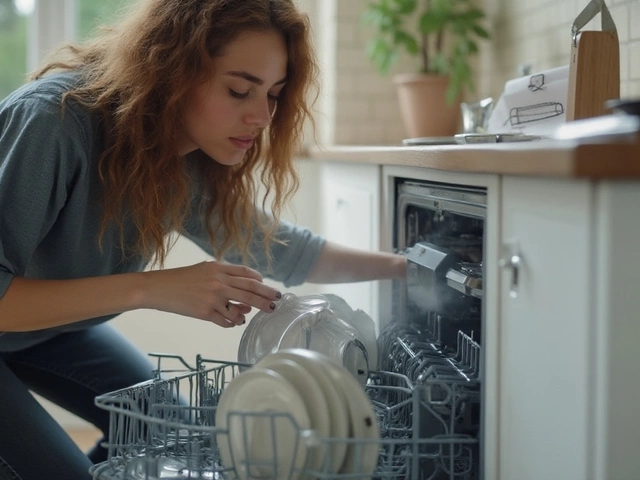In the bustling heart of the home, the humble dishwasher stands as a silent workhorse. It tackles greasy pots and pans with elegance, giving us more time for things that matter. But like all good things, its service won't last forever. The question many ask is, just how long should a good dishwasher stick around?
Diving into the lifespan of dishwashers is not simply a matter of numbers. Household size, usage habits, and maintenance routines all play pivotal roles. Whether you're figuring out when it's worth calling a technician or considering a replacement, understanding these factors can save both money and hassle.
By taking steps to care for your appliance and knowing what signs indicate wear and tear, you can ensure that your dishwasher remains a reliable ally in the kitchen for many years to come. Journey through this guide as we unravel the essential truths and tips to elongate the life of your dishwasher.
- Understanding Dishwasher Lifespan
- Factors Affecting Longevity
- Maintenance Tips for Longevity
- Signs Your Dishwasher Needs Repair
- When to Replace Your Dishwasher
- Energy Efficiency and New Models
Understanding Dishwasher Lifespan
Dishwashers have become indispensable in modern kitchens, offering us not just convenience but also a touch of luxury. But just how long does a dishwasher last? On average, a well-made dishwasher has a lifespan ranging between 7 to 12 years, as noted by industry experts. Yet, this range isn't set in stone. It can fluctuate based on several crucial factors, including usage levels, maintenance practices, and even the brand of the appliance. For the average family of four, running the dishwasher five times a week, such an appliance might lean toward the lower end of that lifespan spectrum.
Several brands are synonymous with **kitchen appliances** longevity. For instance, European brands are often praised for their durability, while some American brands boast advanced features but may have shorter lifespans if not properly maintained. According to a Consumer Reports survey, dishwashers are among the top kitchen appliances that homeowners choose to repair instead of replace. This preference persists because of the intricate attachments to reliable brands and substantial repair-friendly designs which can significantly prolong appliance life.
The Importance of Usage Patterns
Just as crucial as brand and manufacturing quality are the patterns of use that mark a dishwasher's journey through the years. Regular usage can stave off mechanisms seizing from underuse, but overloading or improper use can lead to problems. Loading the dishwasher efficiently is more of an art than many recognize. Plates and pots jostling against each other or improper detergent use can accelerate parts' wear and tear. So the art of loading shouldn't be overlooked.
"Regular maintenance and appropriate usage can almost double the lifespan of your appliance." - Appliance Connection
Given this reality, understanding and respecting your dishwasher's load limits and operating instructions is paramount. Moreover, hidden variables such as water quality in your area can dramatically impact longevity by causing mineral buildup within the system. Hard water systems tend to leave mineral deposits that stress the dishwasher’s mechanism, thus necessitating more frequent descaling.
| Brand | Average Lifespan (Years) |
|---|---|
| Miele | 10-13 |
| Bosch | 9-12 |
| Whirlpool | 8-11 |
We're now living in a savvy technological era where even **repair tips** aspects are a Google search away, yet understanding these innate fundamentals of your dishwasher truly powers its longevity. Explore trusted online forums and tutorials to bolster your knowledge and uncover maintenance techniques that suit your appliance best. If armed with this information, troubleshooting minor issues becomes a piece of cake.
Factors Affecting Longevity
When pondering the duration a dishwasher lifespan might span, one cannot ignore the myriad factors that either nurture or nibble away at its longevity. First off, the frequency of use plays a remarkable role. A household bustling with activity, perhaps a lively family of five, relies heavily on its dishwasher, running it through its cycles on a daily basis. Compare this to a couple, who might only set it in motion a few times a week. This difference in usage frequency directly impacts the wear and tear the machine experiences, affecting its life expectancy.
Dishwasher maintenance often acts as the silent guardian of appliance longevity. Regularly cleaning the filter, inspecting spray arms for clogs, and descaling the machine to eliminate mineral buildup are steps that fortify its endurance. Many underestimate how simple upkeep can stave off the deterioration of function. A report by the Home Appliance Manufacturing Association highlights that cleaning the filter monthly can increase efficiency by up to 30%.
Another critical element is the quality of water itself. Households subject to hard water may find their dishwashers grappling with limescale, which can impede key components over time. Using water softeners or conditioners might not only reduce mineral buildup but extend your dishwasher's operational days. Energy efficiency initiatives that urge consumers toward eco-friendly practices also come with benefits. Modern machines crafted with energy efficiency in mind not only conserve water but are often designed to outlast their older counterparts.
"Regular maintenance might initially seem unnecessary, yet over the appliance's lifetime, it proves invaluable," says Claire Hughes, a leading expert from the Appliance Conservation Group.
The brand and build quality shouldn't be overlooked. With trends moving toward sustainability, many brands have invested in creating more durable machines that align with green initiatives. Higher-end models may offer advanced features and sturdier construction, though a slightly heftier price tag. Cost-savvy consumers must weigh initial expenditure against potential repair costs down the line, making informed choices that could affect the ultimate lifespan of their priced kitchen ally. The installation process also matters. An improperly installed dishwasher can leak or work inefficiently, hastening its demise. Ensuring professional installation can set the stage for its premier performance.
Signs of Wear
Distinguishing early signs of strain, such as strange noises, diminished cleaning power, or persistent leakage, serves as an early warning. Swiftly addressing these issues often reveals underlying causes and prevents compounding concerns. Keeping an eye out for such symptoms, armed with knowledge on effective DIY fixes, not only shields you from unexpected breakdowns but promotes an extended dishwasher lifespan.

Maintenance Tips for Longevity
Keeping a dishwasher in prime condition isn't just about ensuring it does its job effectively, but also about making your investment last. A little regular maintenance goes a long way, and it's surprisingly easy to fit these tasks into your usual kitchen routine. With the right care, your trusty machine can stand the test of time, enduring years of detergent-laden battles without breaking a sweat. But how exactly does one keep the wheels turning smoothly in this essential kitchen gadget?
First and foremost, remember to regularly clean the filters. Most dishwashers have a detachable filter at the base that can collect food particles and debris over time. If these build up, they can impede water flow, causing your dishes to come out less than spotless. Clean these filters once a month by removing them and rinsing under warm water to clear away any gunk. This small step can significantly enhance the cleanliness of your clean-ups and bolster the machine's functioning.
The next step is to check the spray arms. These are the parts that gently rain water onto your dishes. Over time, they can become blocked with mineral deposits or leftover food, reducing their effectiveness. Remove these arms periodically, and clean them using a small brush or toothpick to dislodge any clogs. Doing this ensures that all surfaces of your dishes get the cleaning they deserve, boosting the appliance's efficiency.
Equally important is avoiding overloading. It's tempting to cram every dish in, especially after a large meal, but stacking too much can block water and detergent from reaching every surface, leaving you with half-clean dishes and a machine that's working harder than it should. Follow the appliance's loading guidelines to arrange utensils, plates, and glasses in a manner that allows for optimal water flow.
Run a maintenance cycle regularly. Most dishwashers today come equipped with a self-cleaning or maintenance cycle. Running this without any dishes inside, perhaps with a cup of vinegar or a commercial dishwasher cleaner, can dissolve grease and remove odors and residues hanging around in the machine. This keeps your dishwasher smelling fresh and operating smoothly.
Check the door seals too. These rubber gaskets ensure that no water leaks out during the wash. As with any rubber component, wear and tear are common, and when they occur, efficiency can drop significantly. Simply wipe them down every now and then with a damp cloth to remove any trapped debris, and replace them if you notice any cracking or damage.
"A little maintenance goes a long way," notes appliance expert George Sanders. "By regularly cleaning and inspecting your dishwasher, you can extend its life by a few years and ensure it works properly day in, day out."
Finally, be mindful of the kind of detergents you use. Hard water areas might require formulas designed to tackle mineral buildup, while others can do with lower-suds detergents that don't leave residue. The correct choice can reduce internal wear and tear, making for a happier, longer-lasting machine. With these simple habits and checks, extending the lifespan of your dishwasher becomes a simple, achievable task. Remember, consistency is key, and your efforts will pay off in the form of that perfect sparkle on your clean dishes.
Signs Your Dishwasher Needs Repair
Everyone appreciates the convenience of a dishwasher when it works seamlessly, but there comes a time when problems start showing up. It's crucial to catch these signs early to avoid more costly repairs or the need for a replacement altogether. The wise homeowner knows that being observant and proactive can save both money and headaches down the line. One of the first signs might be unusual noises. A dishwasher typically hums and clicks gently, but when grinding, banging, or clunking starts, it's a signal to check things out. These noises often suggest an issue with the motor or the pump. Ignoring them could lead to more severe, costly damage.
Next, if you find your dishes aren't coming out as clean as they once did, it might be time to investigate. Any clogging in the spray arms or an underperforming heating element can both affect how well your appliance cleans. Those with high usage might notice this sooner, necessitating closer attention to maintenance. Another clear indication is water leaks. Puddles forming beneath your dishwasher may point to worn door seals, or potentially issues more central to the system like loose hoses or faulty valves. Not only does this waste water, but also poses risks related to floor damage and mould development.
Unwanted odours emanating from the dishwasher can also be a warning sign. These smells might come from trapped food residues or a clogged filter. Neglecting this small issue can ultimately affect performance, leading to larger repair needs. Regular detergents and heavily soiled dishes can be harsh on components, shortening their lifespan without intervention.
Common Electrical Issues
Besides mechanical troubles, don't overlook electrical and control panel problems. Flickering or failing lights and buttons that don't respond signal a need for professional intervention. The worst-case scenario involves hidden wiring damage, which can compromise safety."An early response to any unusual signs from your dishwasher can extend its lifespan significantly," advises Alex Turner, an appliance repair specialist with over two decades of experience.To aid your decision-making, here is a simple checklist of signs which might indicate it's time to call in an expert:
- Unexplained sounds or vibrations
- Water pooling under the unit
- Persistent odours that don't vanish after cleaning
- Dishes not drying properly
- Control board irregularities
According to a survey conducted by the Appliance Manufacturers Association in 2023, 55% of dishwasher repairs come from ignoring early warning signs. This statistic underlines the importance of being observant and reacting promptly. By keeping these signs in mind and scheduling regular checks, you can prevent minor inconveniences from ballooning into full-scale dishwashing disasters.

When to Replace Your Dishwasher
Recognizing the signs of a failing dishwasher is crucial to maintaining a smoothly running kitchen. Regular maintenance can delay the inevitable, but there comes a point where replacing your appliance is more cost-effective than constant repairs. In general, the normal lifespan of a dishwasher is about 9 to 12 years. As your trusty machine approaches or surpasses this age, keep a lookout for key indicators that suggest it might be time to scout for a new one.
One of the most telling signs that you need a new dishwasher is an increase in repairs. When the cost of frequent fixes starts to rival a new machine's price tag, it's wise to consider the latter. Additionally, inconsistent cleaning results are a red flag. If your plates, cutlery, and glasses don't come out sparkling clean anymore, this could mean internal components are deteriorating. Higher energy and water bills can also indicate inefficiency—something newer models are designed to combat with modern, eco-friendly technology.
A leaking dishwasher is more than a nuisance; it can cause damage to your kitchen floors and cabinets. While small leaks might be repaired, significant ones often hint at a need for replacement. Strange noises, persistent errors, or even the machine not turning on can signal deeper issues, pointing to the end of your dishwasher's life. When facing these problems, list them out to evaluate whether they're worth the investment in future repairs or if a sleek new model would better serve your home.
Recent advancements in kitchen appliances have introduced energy-saving features that provide real value, sometimes making it worthwhile to upgrade sooner than planned. Some modern units use up to 70% less energy than older versions, offering a chance to not only help the environment but also reduce utility costs over time. Considering the compact yet powerful nature of the latest models, the upgrade could be more beneficial for maximizing your kitchen space as well.
"According to Consumer Reports, investing in a new dishwasher can be economically sensible, especially if your current model predates significant improvements in energy efficiency regulation standards," notes the home appliances expert.
Assessing whether to repair or replace involves more than just functionality. The aesthetic appeal of your kitchen may also benefit from an upgrade, especially if your current appliance is starting to look dated. Newer models are designed with contemporary styles that can match or complement the rest of your kitchen's theme, and many come with features you might not have thought you needed, like smart connectivity or customized wash settings. In the end, choosing when to replace your dishwasher boils down to understanding your budget, style preference, and, of course, your commitment to maintaining an efficient home.
Energy Efficiency and New Models
When deciding on a new dishwasher, the vast sea of choices might seem overwhelming. However, focusing on energy efficiency can be a guiding light. Not only does it help save money on monthly utility bills, but it's also a nod towards an environmentally-friendly lifestyle. The latest models in the market are not only designed to clean your dishes effectively but also to conserve water and energy. Manufacturers often label their products with the Energy Star certification, a hallmark of energy conservation. This label means the appliance is at least 12% more energy-efficient and 30% more water-efficient than current federal standards. Selecting a machine with such credentials assures you that you're making a smart choice for both your wallet and the planet.
Apart from the efficiency labels, technological advancements add a layer of allure to newer models. Dishwashers now come equipped with features such as soil sensors that automatically adjust the water usage and cleaning cycle length based on the load's soil level. This innovation not only improves performance but significantly reduces wasted resources. Adjustable racks, multiple spray arm setups, and advanced filtration systems are just some of the innovations that enhance the functionality of these appliances. An emerging trend is the integration of smart technologies, where you can control your dishwasher from your phone, receive alerts, and even diagnose issues remotely. It’s a blend of traditional cleaning power with modern-day convenience.
The importance of upgrading to a new model becomes even clearer when you consider the statistics. Older dishwasher models, especially those over a decade old, can consume more than 10 gallons of water per cycle. In contrast, a new, energy-efficient model uses as little as 3 gallons, and in many cases, less than 2. This can result in significant savings, especially in larger households or in areas with high water costs. To put it in perspective, by replacing a 10-year-old dishwasher with an Energy Star-certified new model, the savings could amount to around $35 a year on utility costs. Over the lifespan of the dishwasher, that adds up to a considerable sum.
A report by the Rocky Mountain Institute found that many households overlook the long-term savings and environmental benefits of efficient appliances due to the higher upfront costs.
"Investing in energy-efficient appliances is like paying for a membership that provides dividends for years," says Richard Bradley, a leading expert in sustainable appliance technology.With this mindset, it's easier to grasp why it's worthwhile to invest in a quality, efficient dishwasher. As you assess your options, remember that the savings on utility bills and resource conservation align with both economic and environmental goals. And with the rapid pace of technological innovation, today’s dishwashers are setting new benchmarks in both style and substance.




